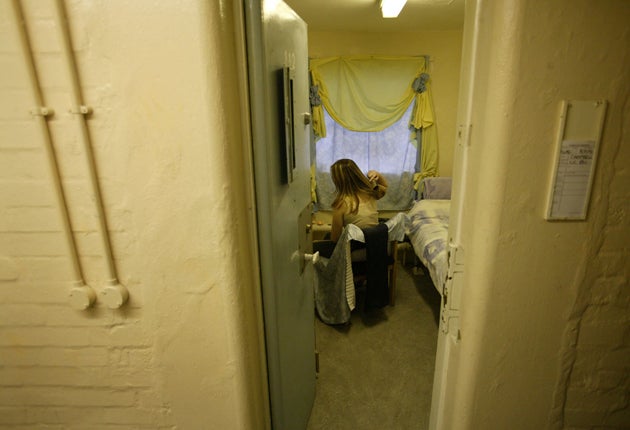Epidemic of self-harm sweeps women's jails
Prison system criticised after number of incidents doubles in five years

The number of women deliberately harming themselves in prison has almost doubled in five years – despite repeated government promises to improve conditions in women's jails.
Officials recorded 12,560 cases of women prisoners injuring themselves – mainly by cutting and burning – last year, equivalent to almost three incidents per inmate. In 2003, 6,437 instances of self-harm were recorded in English prisons, about 1.5 per inmate.
Although women make up just five per cent of the prison population in England and Wales, they account for more than half of all self-harming incidents.
Many of the women in prison have been convicted of minor crimes, but suffer high levels of mental illness and drug abuse. The largest number of incidents last year was in Eastwood Park prison, in Gloucestershire, where 2,584 were recorded, compared with 683 just five years earlier. High levels of self-harm also occurred in Styal, Cheshire (2,103 incidents last year), Holloway, north London (1,829), Bronzefield, west London (1,517) and Peterborough (1,337).
Paul Holmes, the Liberal Democrat justice spokesman, who obtained the figures, said: "It is nothing short of a disgrace how women are treated in our overcrowded penal system. It shows how desperate the situation is that the number of incidents has doubled."
He said: "The issue of women in prison has been ignored for far too long. There are record numbers behind bars but no evidence of a corresponding rise in women committing more serious crime.
"The Government must realise prison is not the right place for female offenders who pose no threat to the public."
A total of 4,291 women are currently in prison, a slight fall on last year, but still nearly double the number held just a decade ago. Research suggests that more women are sent to prison for shoplifting than any other crime. Forty per cent of sentenced women serve just three months or less. More than half of women in prison report they have suffered violence at home, and one in three has suffered sexual abuse. Two-thirds have a neurotic disorder, such as depression, anxiety and phobias.
Juliet Lyon, director of the Prison Reform Trust, said: "Women injure themselves repeatedly in prison because they are mostly in a terrible state: poor, scared and ill, hurting from painful separation from their children, and detoxing from drugs and drink."
She added: "Why do we lock up our most damaged and vulnerable women in bleak under-staffed institutions which, despite best efforts, are almost bound to make them worse?"
A Prison Service spokeswoman said it has "a broad, integrated and evidence-based prisoner suicide prevention and self-harm management strategy that seeks to reduce the distress of all who live and work in prisons".
She said: "Government investment in prisons in recent years has resulted in a number of improvements in the women's estate: services for women who have misused drugs; programmes to address offending behaviour; in-reach community mental health teams; various resettlement projects, such as accommodation advice and mentoring."
Last year the government promised to provide extra money to community programmes that help the rehabilitation of repeat petty criminals, such as shoplifters. It also said it would mount a campaign to persuade magistrates to look at tough alternatives to jail for female offenders, many of whom have small children.
Join our commenting forum
Join thought-provoking conversations, follow other Independent readers and see their replies
Comments
Bookmark popover
Removed from bookmarks